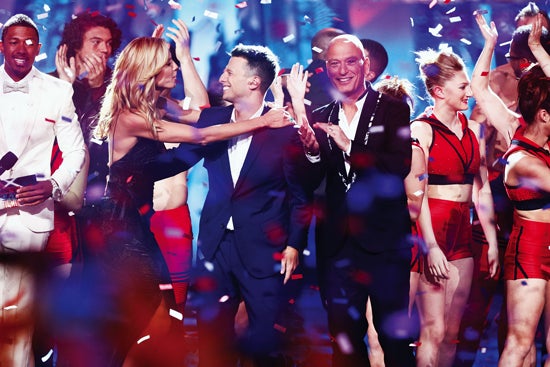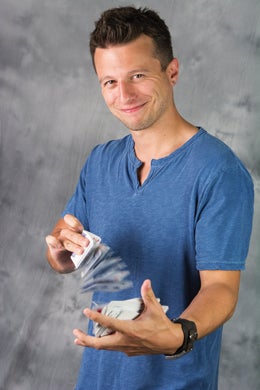The Magician’s Quest

Mat Franco ’10 thought he’d spend his career working the college circuit, until his decision to enter the country’s biggest talent show paid off in spades. What now?
In hindsight, viewers of NBC’s America’s Got Talent could have pinpointed the moment Mat Franco ’10 nailed his victory: his performance during Semifinal 2 of the popular show’s ninth season, at New York’s Radio City Music Hall.
The 26-year-old Franco, boyish but smooth in his grey blazer and black slacks, offers a deck of cards, just as he has during each previous round. But this time, the trick is going somewhere else. He asks judge and former Spice Girl Mel B if she has her cell phone.
“I always have my cell phone,” she says in her British accent, relinquishing it. He snaps her photo, there’s a gaffe involving a glass of water, and suddenly, the iPhone is gone.
Mel B doesn’t seem to be feigning her dismay as Franco asks another judge, Heidi Klum, to help him find it. Klum dials Mel B’s digits, and a phone rings—somewhere in the audience.
The camera follows Franco as he leads Mel B to a seat, turfs out its confused resident, and brandishes a large pocketknife. He invites Mel B to reach inside the stuffing, and voila! A white model just like the one she lost. Can it really be hers?
“If this is your phone, it will have the photo” taken earlier, Franco says.
 And of course, it does.
And of course, it does.
There’s more to the trick, but we won’t tell all—watch the video (below) to see Franco do his thing, so confident, so close to creating an illusion of effortlessness that you have to really pay attention to see just how hard he’s working.
https://www.youtube.com/watch?v=2xifiXwJ41Q
But then, he’s been working hard for pretty much his entire life. Really hard. And all that grind, poured into his romance with the old-fashioned craft of stage magic, has helped him pull off something remarkable: making magic seem relevant in the age of digital special effects.
It’s a bigger triumph even than the $1-million first prize from America’s Got Talent, although the money doesn’t hurt. It’s safe to say he’ll be investing that cash back into his act. Because more than anything else, he wants to sustain America’s reborn interest in magic. He just has to figure out how.
Franco, a Johnston native, has loved magic ever since he can remember. Twenty years ago, when magic acts were still evening TV fodder, he would record shows and play them back, trying to puzzle out the tricks. He worked local birthday parties for $50 that his parents or older brothers had to drive him to; even performed in Vegas as a teen. During his URI years, he started honing a stage act aimed at the college market.
It wasn’t exactly a conventional career choice; Card Shark 101 has yet to be listed on any college curricula. His choice of major now reveals itself as brilliant—Franco credits the business skills learned here as a major factor in his success—but at the time, he felt lost. “Should I study something random as a back-up plan? Or choose something complementary to magic?” His reasoning for majoring in marketing: “If no one comes to see your show, then you don’t have a show.”
More focused than many of his peers, he found a home in URI’s orientation program (and performs for it still). Every summer, when other students headed to the beach, orientation leaders moved into a dorm together to run an intensive program aimed at welcoming, educating and entertaining incoming freshmen. He made some of his closest friends, met the classmate who’s still his girlfriend—and learned to survive in a fish-bowl environment, a skill that came in handy last summer.
“We lived and worked together,” he remembers. “You really form a bond with those people. Kind of like when you’re stuck in New York City in a hotel with a bunch of contestants on America’s Got Talent—you get close.”
His biggest adjustment? Having a stage crew. “I’m so used to being a solo act,” he says, and it’s true—watch one of his college shows (posted on his website, matfranco.com) and you see him working the stage completely alone, including lighting and music cues. America’s Got Talent represented an awe-inspiring adjustment. “The stage manager was the same guy who does the Oscars,” Franco marvels. “The special effects guy worked for Cirque du Soleil. There’s a pyro guy—I mean, how do you become a pyro guy? How does that even happen? You have to be incredibly passionate about what you do. And this team of people, they were helping to take my ideas and make them great.”
Listening, you can’t help concluding that this is part of Franco’s success: his admiration for others is genuine. It doesn’t hurt that his charm goes hand in hand with a single-minded focus on his craft. He’s not giving away any secrets, but he says some of the stunts he pulled off on TV are things he’s been dreaming up for decades. Others, he had to invent in days.
“I put my best idea forward each time and worried about outdoing it later,” he says.
Franco entered the competition as a marketing ploy: he hoped to make it to the first televised round, and in the process win a five-second spot that he could use in his demo. So he went all out, telling a sort of story about the judges using a deck of cards. To a layperson’s eye, it seems like the simplest stunt he performed, but he disagrees: “There’s no secret to that trick. But only an advanced magician can do a story trick—you’re shuffling and you can’t let the judges or audience see how you’re keeping track of the cards. That was a 10 in difficulty.”
Later stunts became more complicated as he learned to leverage the crew’s expertise. And there were times when he had to fall back on his college stage experience. “All my time performing has helped me cope with things going wrong, rolling from Plan A to Plan B to Plan C,” he says. “That’s something URI stressed, getting internships, and I know now it’s true. There’s no substitute for flight time.”
But that college-gig business, which he has run from Newport the past few years—and which has helped him log thousands of miles of airtime doing 200 shows a year around the country, earning a decent living without ever having to schlep as a waiter—is now history. “That’s the thing about winning,” he says. “There’s no going back. I had gotten very comfortable with what I was doing before. All of a sudden, I have to figure out how to take it to the next step.”
It’s not something you can do alone, he says, so he spent the fall playing out his previously booked shows, doing a special in Vegas for NBC, and assembling a team that includes some of Klum’s advisors. Possibilities include a TV show, a Las Vegas show, or a tour. Or more likely, some combination of all three. “Magic was meant to be seen live, and I used to worry that it loses something on TV,” he says. “To make it work for the cameras, while also entertaining a live audience and sticking within the time constraints—it’s a challenge.”
A challenge Franco is up to. Magic already seems cooler than it used to: this fall, it’s in the zeitgeist, from the Discovery Channel’s “Breaking Magic” to local school enrichment offerings. Franco says that’s a good thing: “I got my vocabulary as a child from watching adult magicians—they’re generally very well spoken. I can’t even tell you what magic does for self confidence and public speaking. It’s all about connecting with people.”
We can’t wait to see what’s in the cards for magic now.
—Pippa Jack and Elaine Beebe
 Home
Home Browse
Browse Close
Close Events
Events Maps
Maps Email
Email Brightspace
Brightspace eCampus
eCampus


